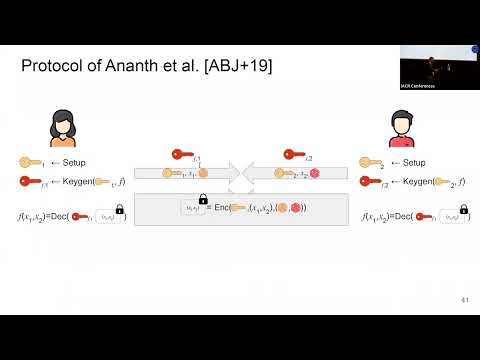CryptoDB
Round-Optimal and Communication-Efficient Multiparty Computation
| Authors: |
|
|---|---|
| Download: | |
| Presentation: | Slides |
| Conference: | EUROCRYPT 2022 |
| Abstract: | Typical approaches for minimizing the round complexity of multi-party computation (MPC) come at the cost of increased communication complexity (CC) or the reliance on setup assumptions. A notable exception is the recent work of Ananth et al. [TCC 2019], which used Functional Encryption (FE) combiners to obtain a round optimal (two-round) semi-honest MPC in the plain model with CC proportional to the depth and input-output length of the circuit being computed---we refer to such protocols as circuit scalable. This leaves open the question of obtaining communication efficient protocols that are secure against malicious adversaries in the plain model, which our work solves. Concretely, our two main contributions are: 1) We provide a round-preserving black-box compiler that compiles a wide class of MPC protocols into circuit-scalable maliciously secure MPC protocols in the plain model, assuming (succinct) FE combiners. 2) We provide a round-preserving black-box compiler that compiles a wide class of MPC protocols into circuit-independent --- i.e., with CC that depends only on the input-output length of the circuit---maliciously secure MPC protocols in the plain model, assuming Multi-Key Fully-Homomorphic Encryption (MFHE). Our constructions are based on a new compiler that turns a wide class of MPC protocols into k-delayed-input function MPC protocols (a notion we introduce), where the functions to be computed is specified only in the k-th round of the protocol. As immediate corollaries of our two compilers, we derive (1) the first round-optimal and circuit-scalable maliciously secure MPC, and (2) the first round-optimal and circuit-independent maliciously secure MPC in the plain model. The latter MPC achieves the best to-date CC for a round-optimal malicious MPC protocol. In fact, it is even communication-optimal when the output size of the function being evaluated is smaller than its input size (e.g., for boolean functions). All of our results are based on standard polynomial time assumptions. |
Video from EUROCRYPT 2022
BibTeX
@inproceedings{eurocrypt-2022-31896,
title={Round-Optimal and Communication-Efficient Multiparty Computation},
publisher={Springer-Verlag},
author={Michele Ciampi and Rafail Ostrovsky and Hendrik Waldner and Vassilis Zikas},
year=2022
}

